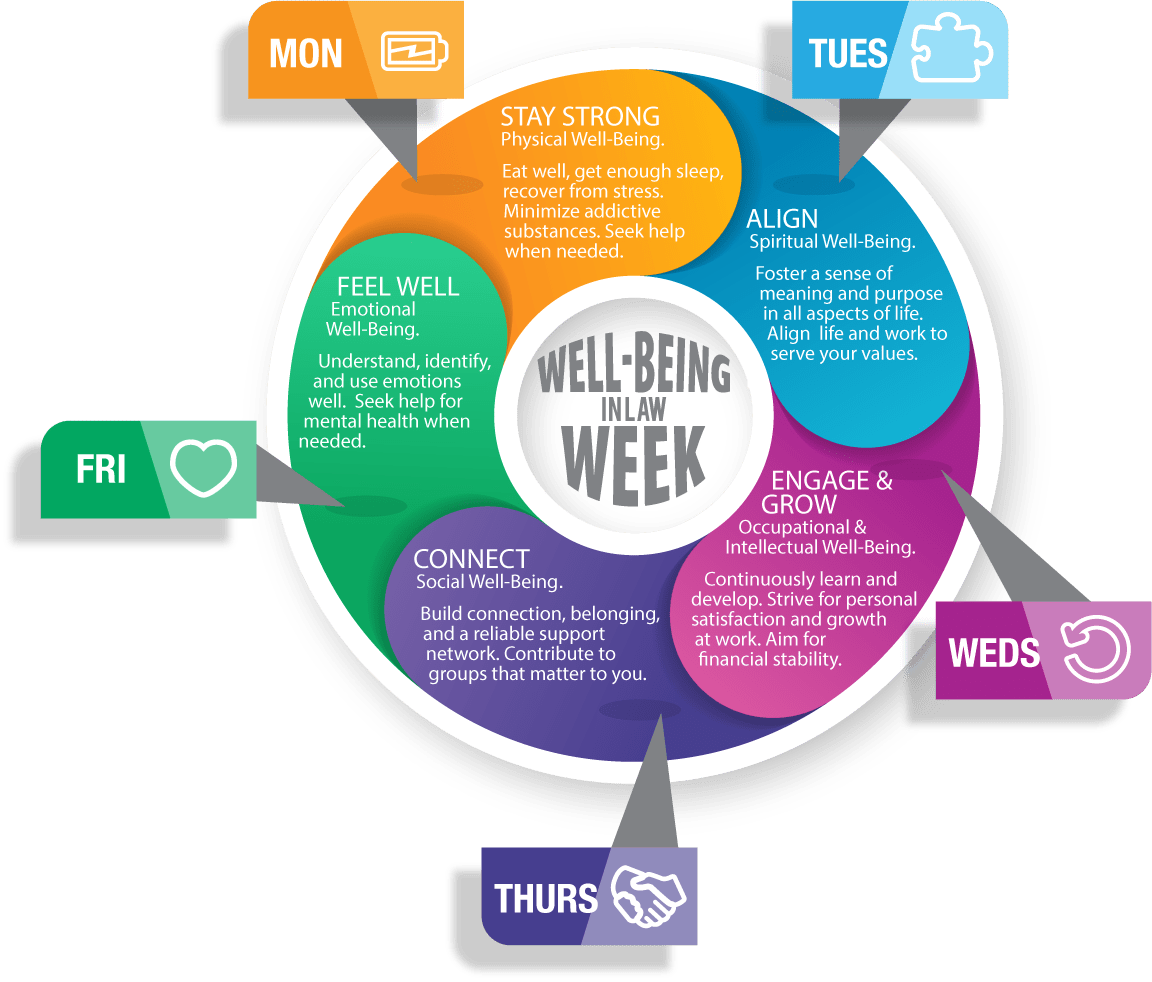Lawyers are often expected to put clients’ needs ahead of their own. But what happens when your mental health takes a backseat?
May 1st marks the beginning of Mental Health Awareness Month, and it is clear that the mental demands of being a lawyer can take a toll on well-being.
Below, we’ll discuss the current state of mental health concerns in the legal industry and explore why – and how – lawyers should prioritize their mental health now and in the future.
What are the mental demands of a lawyer?
It goes without saying that being a lawyer is a highly demanding job. The mental demands of a lawyer often involve long hours of research, preparation of legal documents, and maintaining communication with colleagues and clients – all while juggling multiple cases at once. While some may thrive in such an environment, for many it can be overwhelming and lead to feelings of stress, anxiety or even burnout. The pressure of representing their clients to the best possible outcome can take an immense toll on their mental well-being.
Lawyers must also remain up-to-date with the latest regulations and laws, as well as any changes within their field or specialty. This requires a great deal of dedication and knowledge, which can further add to the strain of the job if not managed properly. Not only this, but lawyers are often required to present evidence in courtrooms or during client meetings – something which can be daunting for even the most seasoned professionals.
Furthermore, lawyers face a number of ethical dilemmas throughout their careers; ranging from conflicts between personal values and professional obligations to important decisions about how best to represent their clients’ interests in accordance with the law. Such dilemmas can be emotionally draining and may cause moral anguish if handled incorrectly – which is why it is so important for lawyers to take appropriate steps to protect their mental health while they practice law professionally.
Do lawyers struggle with mental health?
The legal profession has long been recognized as a high-pressure, demanding job. Recent studies have found that lawyers are more prone to depression and anxiety than the general population.
With long hours, difficult decisions and the potential for financial losses, lawyers are often at risk of burnout and depression if they do not take steps to mitigate these risks. Additionally, the stigma surrounding mental illness in the legal profession has also been found to contribute significantly to issues such as anxiety and depression. Lawyers may feel like they cannot openly discuss their feelings or take time off due to fear of judgement from colleagues or clients.
This is why it is so important that the legal industry makes mental health and well-being a high priority.
In a 2023 study on the link between lawyers’ stress and suicidal thoughts, 66% of respondents said that their time in the legal profession had been detrimental to their mental health, and 46% of them said they were considering leaving the profession due to stress or burnout.
These figures are concerning given the potential consequences associated with prolonged periods of depression or anxiety. Professionally, mental health problems can interfere with a lawyer’s ability to make sound judgments, which could lead to costly mistakes for clients or potentially even disciplinary action against the lawyer themselves. Personally, it can lead to burnout, which can have a negative impact on hobbies outside of work, personal relationships and overall feelings of happiness.
Mental health concerns among lawyers are real and need to be addressed. Fortunately, there are steps that both individual attorneys and law firms can take to reduce the risk of poor mental health in their workplaces. By creating a culture where open dialogue about mental health is encouraged, providing access to professional services when needed, and taking measures such as offering flexible working hours or expanding leave policies to help reduce stress levels among employees – law firms can ensure they have an environment where everyone feels supported in managing their mental well-being.
Your mental health should be a top priority
It is essential to prioritize mental health in order to remain productive and happy. Here are just a few areas to consider this month and beyond:
1. Recognize when you are feeling overwhelmed and take a break from your work.
Making time for activities that help relax the mind and body can be extremely beneficial in reducing stress levels and improving overall mental health. This may include taking a walk outside or engaging in physical activity such as yoga or running.
According to the APA, 18% is the percentage of lowered risk of depression among adults who got just half the recommended amount of physical activity per week – the equivalent of about 75 minutes of brisk walking – compared with adults who reported no physical activity.
2. Attending counseling sessions or joining support groups
Talking to a professional or a group of like-minded individuals can help deal with any underlying issues that may be causing anxiety or depression.
3. Get enough restful sleep at night.
Sleep helps restore the body’s energy levels and improves cognitive functioning throughout the day. Most adults should get 7 to 9 hours of sleep a night. Limiting caffeine intake and avoiding alcohol consumption before bedtime can help promote better sleeping habits.
Mental Health America recommends actions such as setting a regular bedtime, meditation, and making your bed a sleep haven as ways to get longer and better sleep.
4. Set realistic expectations and boundaries for yourself and don’t overwork beyond what is manageable.
Establishing professional boundaries can help give you a sense of control over your work and allows for more time to do things that you love – spending time doing something you truly enjoy can provide major improvements to your mental health and well-being.
5. Stay connected with family, friends and colleagues.
Having a network helps to create a sense of belonging and provides support during difficult times. Developing strong social networks has been shown to improve one’s ability to cope with stressors more effectively, which can lead to improved mental health outcomes in the long run.
6. Participate in WWIL.
By coordinating or participating in local activities in your profession, you can actively participate in the movement and help raise awareness for mental health.

Source: Institute for Well-Being In Law
Browse guides, ideas, toolkits and resources to actively participate in WWIL.
Prioritizing your own mental health should be a top priority in order to be the best you can be, both personally and professionally. Taking the necessary steps towards self-care such as getting enough sleep, engaging in activities that reduce stress levels, connecting with family/friends, attending counseling sessions or joining support groups can all have positive impacts on overall well-being.
For more on well-being in the legal workplace, explore our blog.











